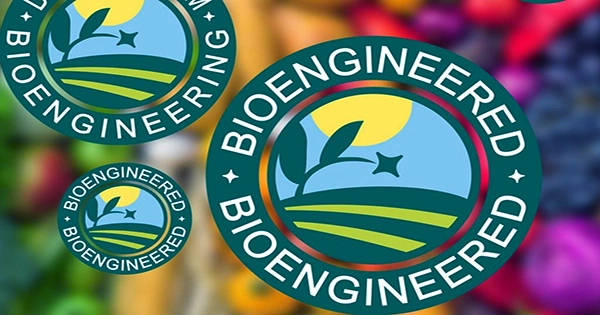In the United States, foods that have been genetically modified and tinkered with in a lab will require new labeling, with the names “GMO” and “GE” being replaced by the phrase “bioengineered.” On January 1, 2022, the United States Department of Agriculture (USDA) implemented new food labeling standards for genetically modified foods.
It refers to food that contains genetic material that has been transformed in vitro using rDNA techniques and achieved alterations that are not found in nature or encouraged using traditional breeding strategies. It also includes goods containing genetically modified components that meet certain “detectable” criteria.
The USDA issued regulations in 2018 requiring obligatory disclosure of goods derived from genetic engineering. According to the current standards, products containing genetically altered food must state so the label, using phrases like “bioengineered food” or “derived from bioengineering,” as shown below.
Alternatively, phone numbers, website URLs, or QR codes can be included on the labels to link them to further information online. According to the USDA, the goal is to simplify the jumbled “patchwork state-by-state structure” that customers may find bewildering. Their decision, however, has sparked a lot of debate.
A non-profit advocacy group, the Center Food Safety, has launched a lawsuit against the USDA, arguing that the new approach will keep customers in the dark about what is truly in their food. They condemn not only the elimination of well-known phrases like “GMO” and “GE,” but also the use of electronic disclosures on the packaging, which they believe is “unprecedented” and discriminates against individuals who do not have access to a smartphone or the internet.
Furthermore, they claim that the new laws have a key flaw: the USDA exempted “highly refined” products from the regulations unless the genetically modified material is “detectable.” They believe that this means the guidelines will not apply to the vast majority of GMO-derived items, such as highly processed foods containing genetically modified substances such as drinks and oils. In a statement, Andrew Kimbrell, executive director of the Center for Food Safety, said, “These laws are not about informing the public; rather, they are meant to allow corporations to disguise their use of genetically modified products from their customers.”
“Consumers have fought for decades for their right to know what’s in their food and how it’s made,” said Meredith Stevenson, an attorney, and counsel in the lawsuit for the Center for Food Safety. “However, rather than providing meaningful labeling, USDA’s final rules would merely increase consumer, store, and manufacturer uncertainty.”
GMOs, bioengineered foods, or whatever you want to call them, have become a boogeyman in some quarters, with detractors believing that the “Frankenstein foods” may have unintended health or environmental consequences. However, a mountain of scientific evidence shows that GMOs are safe to eat, not to mention beneficial to the environment. The National Academy of Sciences in the United States, the American Medical Association, the American Association for the Advancement of Science, and the World Health Organization all agree on this.
















